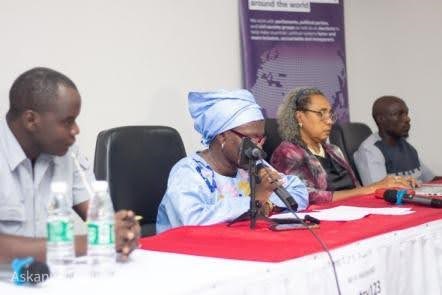By Kebba AF Touray
The Westminster Foundation for Democracy (WFD) conducted training for members of Civil Society Organizations (CSOs) on parliamentary affairs and proceedings, as well as on lobbying and advocacy for democratic reforms last Wednesday, 21 August 2024.
The training was meant to equip CSOs to better understand the procedures of legislation and how to engage Lawmakers, and to empower them to meaningfully and effectively conduct advocacy and campaigns. This aims to enhance communication and feedback and strengthen the advocacy role of CSOs while enabling NAMs to better respond to the needs of CSOs.
Speaking at the opening ceremony, Tabu Njie Sarr, Country Director of WFD, said the foundation is a public body in the UK, established and dedicated to the Gambia in 2018. She said the foundation has been supporting democracy across the world by operating internationally, and said the WFD works with national parliaments, political parties, and CSOs and on elections, to help make a country’s political systems fairer, more inclusive, and accountable.
‘‘This workshop aims to introduce you (participants) to the ideas of advocating for a course and about what advocacy entails, and also to provide linkages between parliaments and CSOs, NGOs and journalists, as well as citizens, to continue to be fostered,” she said.
She highlighted that their partnership network includes key stakeholders within CSOs, as critical advocates for the rights of people.
CSOs she added, also advocate and work hard to reach areas to provide relief for those in need, and by pressing the government and the private sector to ensure public safety, education, environmental responsibility, social health, and economic rights.
“CSOs act as the connecting link between state and society. This training is key because it will enhance your capacity (CSOs) to speak on behalf of the voiceless, and they are key change agents who draw attention to pressing issues, rally the public, and political and financial support, and hold governments and all stakeholders to account for their promises,” she said. She said the training entailed both advocacy and parliamentary processes and to know the work of the parliament as the main institution where the laws of the land are passed.
“As non-state actors who complement government’s efforts and legitimize the democratic process, it is imperative for you to know the most democratic institution and its works and functions in order to better prepare you (CSOs) for proactive advocating,’’ she said.
Yadicon Njie Eribo, the Chairperson of The Association of non-Governmental Organizations (TANGO), said the day marks a significant step towards the enhancement of their collective ability to champion the course of democratic integrity, social justice, and human rights.
“The essence of our gathering lies in understanding and mastering the mechanisms that drive legislative processes and advocacy. As CSOs, we stand at the forefront of promoting and protecting the rights of vulnerable populations including women and children,” She said, adding that the role of CSOs is indispensable in ensuring that democratic institutions not only function effectively but also remain responsible to the needs of all citizens.
“It is vital to appreciate the structures and functions of parliamentary systems. Parliaments are the cornerstone of democratic governance responsible for crafting laws, shaping policies, and representing diverse interests of the populace,” she said. Madam Njie Aribo highlights that understanding how these institutions operate is fundamental for any effective advocacy efforts.
Sainey Conteh, principal table Clerk on behalf of the Clerk of the National Assembly, said “in any democracy, the relationship between parliament and civil society is essential”.
He said parliament serves as the cornerstone of democratic governance and represents the will of the people by crafting legislation and holding government to account. He however said that it is through the active participation and scrutiny of civil society that these processes are enriched and made more robust, and said their role in advocating for transparency, accountability, and inclusiveness ensures that the voices of the citizens are heard and considered in legislative processes. He said that understanding how the legislature operates, will better equip participants in their contributions to the legislative process and to support the causes that they are passionate about.


















